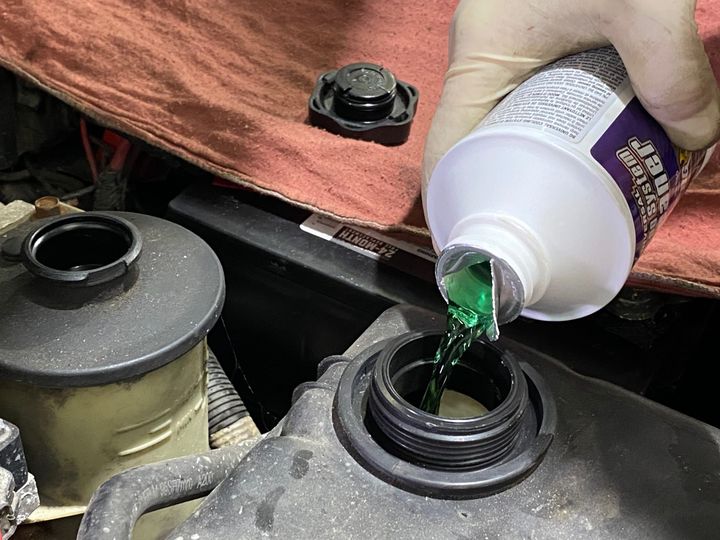


Engine coolant, commonly known as antifreeze, plays a vital role in regulating your vehicle's operating temperature. However, like any other automotive fluid, coolant has a limited lifespan and requires periodic replacement to maintain optimal performance and prevent costly repairs. This guide will explore the factors influencing coolant lifespan, the different types of coolants available, and provide practical maintenance recommendations to keep your vehicle running smoothly.
Coolants are classified into three main categories based on their chemical composition and additive technology. Each type has its unique characteristics and recommended service intervals, as shown in the following table:
| Coolant Type | Description | Typical Lifespan |
|---|---|---|
| Inorganic Acid Technology (IAT) | Traditional green coolants containing inorganic salts and silicates as corrosion inhibitors. Commonly used in older vehicles. | 2 years or 24,000-30,000 miles |
| Organic Acid Technology (OAT) | Long-life coolants using organic acid compounds as corrosion inhibitors. Industry standard for modern vehicles. Available in various colors. | 5 years or 100,000-150,000 miles |
| Hybrid Organic Acid Technology (HOAT) | A blend of IAT and OAT technologies, combining benefits of both. Typically orange or yellow in color. | 5 years or 100,000-150,000 miles |
While the coolant type plays a significant role in determining its lifespan, several other factors can influence how long it remains effective:
Severe driving conditions (frequent towing, idling, or extreme temperatures)
Additive depletion over time
Contamination from rust, debris, or improper coolant mixing
To ensure optimal cooling system performance and longevity, follow these maintenance practices:
Consult your vehicle's owner's manual for the manufacturer's recommended coolant service intervals.
Adhere to the specified service intervals, typically around 100,000-150,000 miles for modern vehicles using long-life OAT or HOAT coolants.
Have your coolant tested periodically to assess its condition and freeze/boil protection levels.
Perform a complete cooling system flush when changing coolants, especially on higher mileage vehicles or when switching between different coolant types.
Neglecting coolant maintenance can lead to various issues, including:
Corrosion and scale buildup
Reduced heat transfer efficiency
Overheating and potential engine damage
Premature failure of cooling system components
On the other hand, timely coolant replacement offers several benefits:
Optimal cooling system performance
Extended component lifespan
Improved fuel efficiency
Reduced risk of breakdowns and costly repairs
It's crucial to use the correct coolant type recommended by your vehicle's manufacturer and avoid mixing different coolant types. Improper coolant mixing can lead to compatibility issues, reduced protection, and potential cooling system damage. Follow these guidelines:
Never mix IAT (green) and OAT (extended life) coolants
Consult your owner's manual for approved coolant types
When in doubt, perform a complete cooling system flush
Maintaining proper coolant levels and adhering to recommended service intervals is essential for ensuring the longevity and efficient operation of your vehicle's cooling system. By understanding the different coolant types, their lifespans, and the factors that influence coolant degradation, you can make informed decisions about when to replace your coolant and take proactive measures to prevent costly repairs. Regular coolant maintenance is a small investment for the peace of mind and reliability of your vehicle's cooling system.
IAT coolants, commonly known as traditional green coolants, have a typical lifespan of around 2 years or 24,000-30,000 miles. They are mostly used in older vehicles from before the late 1990s.
Severe driving conditions like frequent towing, idling, or extreme temperatures, as well as additive depletion over time and contamination from rust or debris, can shorten the effective lifespan of engine coolant.
Neglecting coolant maintenance can lead to corrosion and scale buildup, reduced heat transfer efficiency, overheating and potential engine damage, premature failure of cooling system components, and costly repairs.
Timely coolant replacement offers optimal cooling system performance, extended component lifespan, improved fuel efficiency, and reduced risk of breakdowns and costly repairs.
OAT coolants, which are long-life coolants used in most modern vehicles, have a recommended service life of around 5 years or 100,000-150,000 miles.
HOAT coolants, which are a mix of IAT and OAT technologies, have a lifespan similar to OAT coolants, around 5 years or 100,000-150,000 miles.
When changing coolant types, it is generally advisable to perform a complete cooling system flush, especially on higher mileage vehicles, to remove any residual coolant and contaminants.
Following the manufacturer's recommended coolant service intervals ensures optimal cooling system performance, prevents potential issues, and helps extend the lifespan of cooling system components.
It is crucial to avoid mixing different coolant types, such as IAT (green) and OAT (extended life) coolants, as improper mixing can lead to compatibility issues, reduced protection, and potential cooling system damage.
You can have your coolant tested periodically to assess its condition and freeze/boil protection levels, even if it appears to be working properly, to determine if a coolant change is necessary.

Miguel started tinkering with car radios as a teenager, fascinated by the intricate dance of wires and circuits. This passion led him to pursue a career as an automotive electrician. For the past 10 years, Miguel has tackled everything from flickering headlights to mysterious electrical gremlins. He thrives on troubleshooting electrical problems and enjoys sharing his knowledge to empower car owners to understand their vehicles better.







